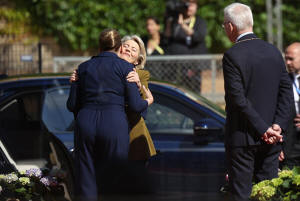Denmark launches its EU presidency facing war in Ukraine and Trump
tariff chaos
[July 03, 2025]
By LORNE COOK
AARHUS, Denmark (AP) — Denmark launched its presidency of the European
Union on Thursday with a call for Europe to unite to take on war in
Ukraine and chaos caused by U.S. President Donald Trump’s global tariff
hike which are likely to mark the Nordic country’s six-month term at the
helm of the world’s biggest trading bloc.
“We have war on European soil. We face trade wars, and new tariffs, and
we have our closest ally, in the United States, turning increasingly
inward,” said Danish European Affairs Minister Marie Bjerre. “Europe can
no longer be in the shadow of the United States. We need now to stand on
our own two feet.”
Prime Minister Mette Fredericksen and European Commission President
Ursula von der Leyen were in the western city of Aarhus for a day of
celebratory events as Denmark started its eighth EU presidency since
joining in 1973.
Presidencies rotate between the 27 EU member countries every six months.
The nation in charge sets policy priorities and organizes the bloc’s
working agenda. It's supposed to act as an “honest broker,” setting
aside national interests to foster consensus.
Denmark is entering its term with the motto “A Strong Europe in a
Changing World.” Its aim is to help ensure the EU can take
responsibility for its own security, boost economic competitiveness and
tackle climate change.
The ceremony was held as large parts of Europe sweltered in high
temperatures.

Russia’s war on Ukraine, now in its fourth year, is seen as an
existential challenge in Europe and will weigh heavily on most policy
debate. Economic turmoil also lies ahead. Trump’s 90-day tariff pause
ends on July 9 with no EU-U.S. trade deal in place as yet.
Getting defense on track and gunning for 5%
NATO has warned that Russia could be ready to attack another European
country in 3-5 years. To prepare, the military alliance — most of whose
members are EU countries — has agreed that national military and
defense-related investment should rise to 5% of GDP.
Denmark’s priority will be to set Europe on track to properly defend
itself by 2030. That will require laying the groundwork for countries to
buy the military equipment needed to execute NATO’s defense plans with
Trump's security priorities lying outside Europe.
That will mean wrapping up negotiations on proposals that will help
countries purchase and make military equipment together.
Enlargement and another defense front
Helping Ukraine, but also Moldova, to join the EU soon is another
security priority. Moldova has been shaken by Russian meddling in the
form of energy coercion, election interference and disinformation
campaigns.
Denmark says it aims to keep the two moving toward membership together,
but Hungary is blocking Ukraine's path. Prime Minister Viktor Orbán
insists that Ukraine should remain a buffer zone between Russia and NATO
countries.
With fresh elections in Moldova in September, pressure is mounting for
the EU to “decouple” their accession tracks. Bjerre said “all political
and practical means” will be used first to persuade Hungary — a small EU
country and the only one standing in Ukraine's way — to lift its veto.
She said it’s important to send clear signals to Balkans countries. Most
have waited many years to join.

[to top of second column]
|

Denmark's Prime Minister Mette Frederiksen greets European
Commission President Ursula von der Leyen for the official opening
of Denmarks EU presidency in Aarhus, Denmark, Thursday July 3, 2025.
(Mikkel Berg Pedersen/Ritzau Scanpix via AP)

Honing a competitive edge
As Trump wages tariff war, trade has changed drastically. The EU has
sought new trade agreements with other countries, such as India,
while other trade pacts are being revamped. Denmark says it's
important to accelerate that process.
The government in Copenhagen says it's also seeking to cut more
bureaucratic red tape in order to speed up innovation.
A major challenge looms in the form of the EU’s next long-term
budget. Von der Leyen plans to unveil the commission's blueprint for
the seven-year spending package, which should enter force in 2028,
on July 16.
With defense spending increases weighing heavily on national purses,
member countries are unlikely to want to stump up more funds for
European priorities. Denmark’s aim is to get the debate — which
could run for two years — off on the right track.
Managing climate change
Despite some backsliding, the EU still holds to its goal of
achieving climate neutrality by 2050, by cutting greenhouse gases
and compensating for any remaining emissions. Denmark will lead work
on setting a 2040 target to guide climate action and investment to
keep the bloc on track.
Part of that will be the transition away from fossil fuels to green
energy forms. Russia’s war on Ukraine has highlighted the dangers of
energy dependence on any one supplier.
Sanctions and political pressure have not stopped some EU countries
of getting their oil and gas from Russia, although the level of
dependency has dropped markedly since 2022. Denmark says the
continued phase out remains a priority.
Copenhagen also says it should be easier for farmers to respect EU
rules. It wants the bloc’s agricultural policy to be simple and
business friendly. One goal is to finalize negotiations on a rule
simplification package.

Migration policy, outsourcing continues
In 2021, Frederiksen spoke of a vision of “zero asylum-seekers,” and
her government will continue down the EU track of seeking
“innovative solutions” to better manage migrants.
Unable to agree how best to cope, EU countries have mostly focused
on deporting people. They’ve tried to establish “return hubs” in
countries outside the bloc where rejected asylum-seekers could be
sent. That approach will continue. Denmark says it's important to
persuade people not to set out for Europe in the first place.
Work will also continue on preparing the vast asylum and migration
policy pact to come into force next year. The pact was seen as the
answer to Europe’s migration woes, but countries still differ on how
best to tackle the challenge.
Under international law, people have a right to asylum if they fear
for their lives, safety or persecution.
All contents © copyright 2025 Associated Press. All rights reserved |